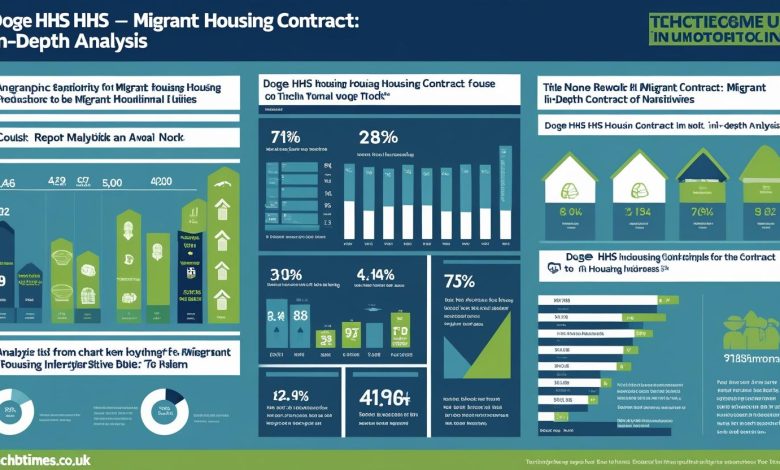Doge HHS Migrant Housing Contract: In-Depth Analysis in 2025

Introduction
The Doge HHS migrant housing contract has emerged as a focal point of discussion and scrutiny in the public and governmental arenas. This contract, involving the U.S. Department of Health and Human Services (HHS) and a private contractor, Doge, pertains to the housing of migrants, particularly unaccompanied minors. This comprehensive article will explore the background, objectives, structure, financial aspects, public response, and future implications of the Doge HHS migrant housing contract.
As migration continues to be a critical issue, understanding the dynamics of the Doge HHS migrant housing contract is key to addressing the humanitarian needs of migrants while also analyzing the economic and political challenges involved in such agreements.
What is the Doge HHS Migrant Housing Contract?
The Doge HHS migrant housing contract refers to an agreement between the U.S. Department of Health and Human Services (HHS) and Doge, a private contractor, to provide temporary housing and essential services for migrants, particularly unaccompanied minors. With a significant increase in migrant arrivals, particularly at the southern U.S. border, federal agencies like HHS were overwhelmed with the scale of the influx. In response, the Doge HHS migrant housing contract was designed to provide immediate relief through temporary housing solutions for migrant families and children.
Why Was This Contract Necessary?
The surge in migrant crossings, particularly among unaccompanied minors, has placed an immense burden on U.S. government agencies. According to reports, facilities such as detention centers and temporary shelters were not equipped to handle the increasing number of migrants. This highlighted the need for external support, and hence, the Doge HHS migrant housing contract was awarded to Doge, a private contractor capable of setting up and managing large-scale housing operations.
Key Objectives of the Doge HHS Migrant Housing Contract
The Doge HHS migrant housing contract has several critical objectives that guide its implementation:
- Provision of Temporary Housing: The main goal of the contract is to provide temporary housing for migrant individuals, especially unaccompanied minors. This housing is designed to be secure, humane, and conducive to the well-being of residents.
- Delivery of Essential Services: Migrants housed under the Doge HHS migrant housing contract are provided with essential services, including meals, healthcare, legal aid, and educational opportunities. These services are meant to support the migrants’ immediate needs as they await further processing or placement.
- Compliance with Legal and Ethical Standards: The contract ensures that Doge operates within the bounds of U.S. law and international human rights standards. This includes ensuring the proper treatment of minors, compliance with family reunification procedures, and the provision of safe living conditions.
The Structure of the Doge HHS Migrant Housing Contract
The Doge HHS migrant housing contract is a multifaceted agreement involving several components to ensure its success. Below is an overview of its core structure:
1. Facility Operations and Management
One of the most important aspects of the Doge HHS migrant housing contract is the establishment and management of housing facilities. Doge is tasked with setting up secure and effective housing units that meet the needs of the migrants. This includes the provision of temporary shelters, housing staff, security personnel, and basic amenities to ensure that the migrants are well cared for during their stay.
2. Service Provision
In addition to housing, the Doge HHS migrant housing contract requires that Doge provide a wide range of services. These services include:
- Health Services: Basic medical care, psychological support, and health screenings to ensure the well-being of all housed individuals.
- Educational Services: The contract stipulates that unaccompanied minors be provided with educational resources, including access to schooling and recreational activities.
- Legal Assistance: Providing access to legal aid is crucial for migrants, especially minors, who may be navigating the U.S. immigration system for the first time.
3. Monitoring and Oversight
To ensure compliance with both the terms of the contract and relevant laws, the Doge HHS migrant housing contract includes provisions for regular monitoring and oversight. This ensures that Doge is held accountable for the conditions under which migrants are housed and the services provided.
4. Staffing and Training
The Doge HHS migrant housing contract places significant emphasis on staffing requirements. Doge is required to hire personnel who are adequately trained in working with vulnerable populations, including minors, and to ensure that staff members adhere to high standards of care and professionalism.
Financial Aspects of the Doge HHS Migrant Housing Contract
Although the specific financial details of the Doge HHS migrant housing contract are not publicly disclosed, reports indicate that the contract involves substantial funding. The U.S. government allocates significant resources to ensure that the housing and services provided meet the needs of the migrant population. These funds cover the establishment of housing facilities, the provision of services, staffing, and other operational costs.
A similar contract awarded to a nonprofit organization for migrant housing was reported to be valued at approximately $18 million per month. This serves as a benchmark for understanding the potential scale of the Doge HHS migrant housing contract in terms of financial commitment.
Public Response and Criticisms of the Doge HHS Migrant Housing Contract
The Doge HHS migrant housing contract has not been without controversy. Various stakeholders, including advocacy groups, legal experts, and members of the public, have raised concerns about the privatization of migrant housing and the potential ethical and legal implications.
Support for the Contract
Proponents of the Doge HHS migrant housing contract argue that it is a necessary response to the immediate needs of migrants, particularly given the overwhelming number of individuals arriving at the U.S. southern border. They emphasize that private contractors like Doge have the resources and capacity to manage large-scale operations and provide essential services in a timely manner.
Criticism of Outsourcing Migrant Care
On the other hand, critics of the contract argue that privatizing migrant housing raises several concerns:
- Accountability: Private contractors are not always held to the same standards as government agencies, leading to concerns about transparency and accountability in the provision of services.
- Quality of Care: Some critics worry that the private sector may prioritize profits over the well-being of migrants, leading to potential lapses in the quality of care provided.
- Ethical Concerns: The ethics of outsourcing the care of vulnerable populations, especially minors, to private entities have been widely debated. Many argue that the government should take a more direct role in providing for the welfare of migrants.
- Case Study: Termination of a Similar Contract
In a related development, the Department of Government Efficiency (DOGE) terminated a contract worth $18 million per month with Family Endeavors, a Texas-based nonprofit that operated a migrant housing facility in Pecos, Texas. This facility, which had been underutilized, was closed after a decision to cut costs. The termination of this contract is seen as a precedent for scrutinizing similar agreements, including the Doge HHS migrant housing contract, and ensuring that taxpayer dollars are being used efficiently.
Legal and Ethical Implications of the Doge HHS Migrant Housing Contract
As with all government contracts, the Doge HHS migrant housing contract must adhere to strict legal and ethical standards. These include:
- Human Rights Compliance: The treatment of minors, in particular, is governed by international human rights law. Ensuring the humane treatment of all individuals housed under the contract is a critical legal requirement.
- Privacy and Confidentiality: Migrant individuals, particularly minors, have the right to privacy and protection. The contract must ensure that their personal information is safeguarded.
- Family Reunification: The Doge HHS migrant housing contract plays a role in the broader efforts to reunite families separated during migration. The contract must align with these efforts and ensure that children are placed in safe environments while awaiting reunification.
- Future Implications and Policy Reforms
The Doge HHS migrant housing contract is likely to have long-lasting effects on both the migrant population and U.S. policy. Some potential outcomes include:
- Policy Reforms: The scrutiny of such contracts could lead to reforms in how the government approaches migrant housing and service provision. There may be a push for more public oversight and transparency in these contracts.
- Public Opinion: Ongoing controversies could influence public opinion about the role of private contractors in public service provision. The debate over privatization is likely to continue in the coming years.
- Legal Precedents: Legal challenges to the Doge HHS migrant housing contract could set precedents for how similar contracts are structured in the future, particularly in terms of accountability and transparency.
Read More: techbtimes.co.uk
Conclusion
The Doge HHS migrant housing contract is a pivotal element in the ongoing challenge of managing migrant flows into the United States. While it offers a solution to the immediate housing needs of migrants, it also raises important questions about the role of private contractors in managing public services. As the situation evolves, it is crucial to monitor the outcomes of this contract and others like it, to ensure that they are achieving their intended goals while respecting the rights and dignity of migrants.


